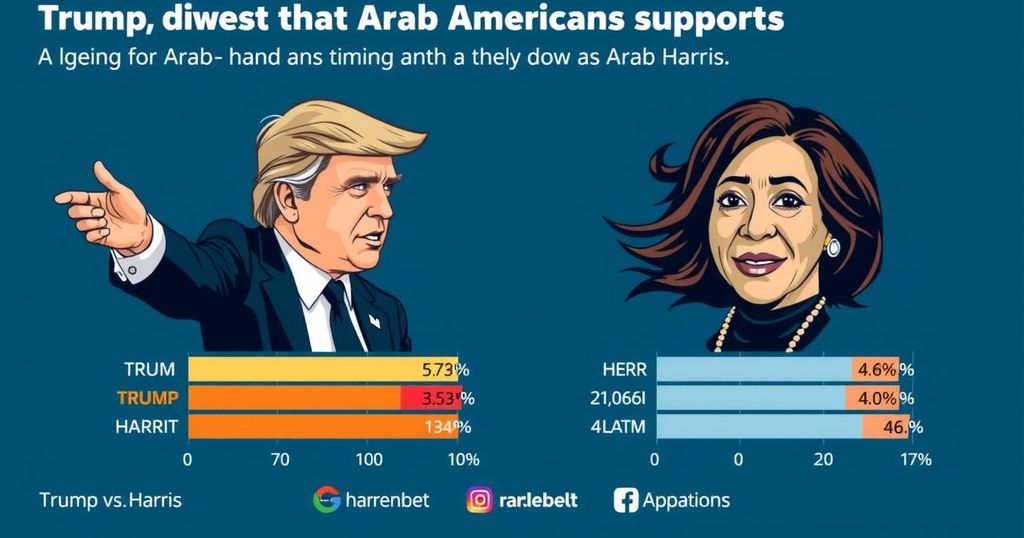Poll Indicates Trump Leading Harris Among Arab American Voters Amid Gaza Conflict
A recent poll shows Donald Trump leading Kamala Harris 45% to 43% among Arab Americans, indicating potential electoral challenges for Democrats due to the ongoing Gaza conflict. Trump is perceived as more capable in resolving the Israel-Palestine conflict, with significant concerns about the same issue among voters. Trump has also criticized Harris’s campaign strategies.
A recent poll indicates that former President Donald Trump possesses a slight lead over Vice President Kamala Harris among Arab American voters, as the presidential campaign moves toward its conclusion. Specifically, Trump garners 45 percent of support compared to Harris’s 43 percent, according to the findings from the Arab News/YouGov survey. This development raises concerns for the Democratic Party, particularly regarding how the ongoing conflict in Gaza is affecting their standing with a significant voting demographic, notably influential in pivotal states like Michigan. The poll reveals that Trump is viewed as more capable than Harris in resolving the Israel-Palestine conflict, with 39 percent favoring him against 33 percent for Harris. Furthermore, both candidates are seen as equally effective regarding general matters related to the Middle East, each securing 38 percent. When participants identified pressing issues for the Arab-American community, 29 percent cited the Israel-Palestine conflict as their primary concern, followed by economic issues (21 percent) and racism and discrimination (13 percent). Despite Trump’s incremental advantage, he is perceived as more supportive of Israel’s current government, leading Harris by a six-point margin in that regard. The survey, drawn from a sample of 500 Arab Americans, has a margin of error of plus or minus 5.93 percent. The results suggest a potential decline in Harris’s support compared to Biden’s performance among Arab Americans in the 2020 election, where Biden enjoyed an 18-point advantage over Harris in related polling. Arab Americans are critical in states like Michigan, which has the highest concentration of this demographic in North America. This state was crucial in the previous elections, where Biden won by approximately 150,000 votes in 2020, a stark contrast to Trump’s slim victory by about 11,000 votes in 2016. In a direct appeal to this constituency, Trump criticized Harris for her collaboration with former Republican Congresswoman Liz Cheney during her campaign efforts in Michigan, Pennsylvania, and Wisconsin. He contended that a continued Harris administration would result in increased conflict in the Middle East, specifically warning that it could escalate to a Third World War, a scenario he asserts would be avoided under his presidency. Despite attempting to reach out to Arab and Muslim voters, Trump’s historical stance has been strongly pro-Israel, reinforcing his message that a lack of his leadership would threaten Israel’s existence.
The recent polling results highlight the shifting dynamics of support among Arab Americans, particularly within the context of the war in Gaza and its implications on the electoral landscape. Understanding the significance of this demographic is crucial, as Arab Americans play a pivotal role in swing states, especially Michigan, where they have the potential to sway election outcomes. Their concerns about the Israel-Palestine conflict, economic issues, and discrimination are critical factors influencing their voting intentions. Additionally, the Republican candidate’s perceived effectiveness in handling international relations adds another layer to this complex electoral scenario.
In conclusion, the poll indicates a competitive race between Donald Trump and Kamala Harris among Arab American voters, suggesting potential vulnerabilities for Harris as the Democrats face challenges stemming from the war in Gaza. The data reveals that Trump’s appeal may be resonating more with this key demographic compared to Harris, reflecting broader concerns regarding foreign policy and local issues essential to Arab Americans. As the election approaches, the outcome in Michigan and similar states may hinge significantly on the sentiments expressed by this community. The results necessitate introspection for the Democratic Party as they seek to maintain strong connections with Arab American voters while navigating complex geopolitical issues.
Original Source: www.aljazeera.com




Post Comment